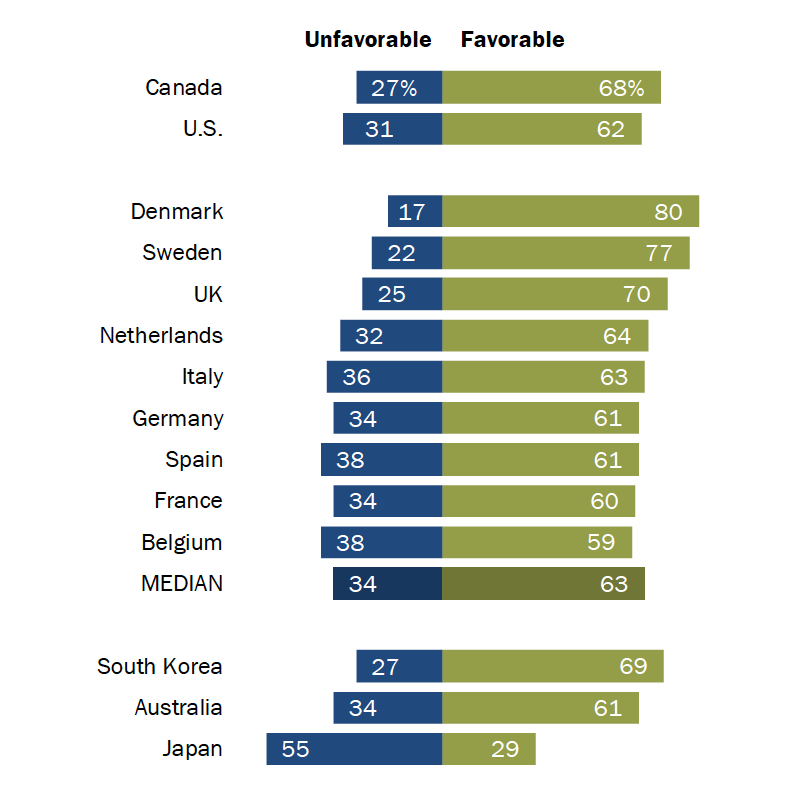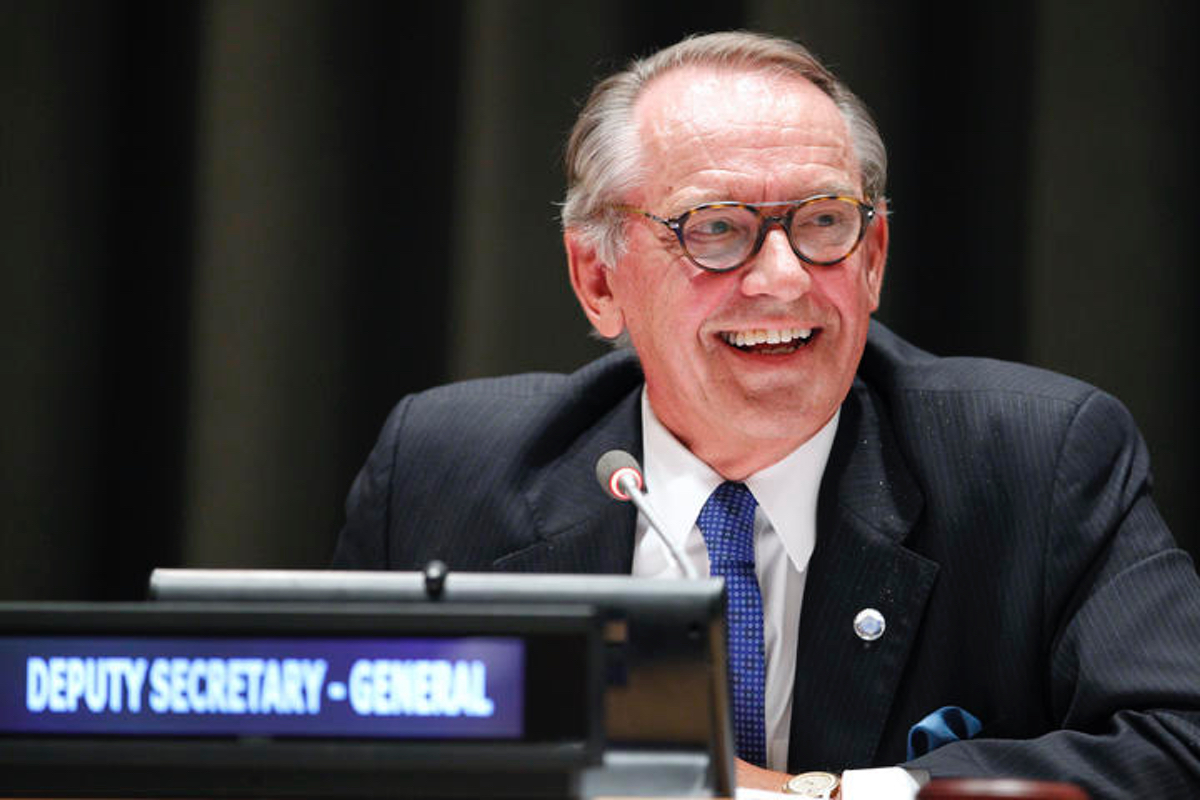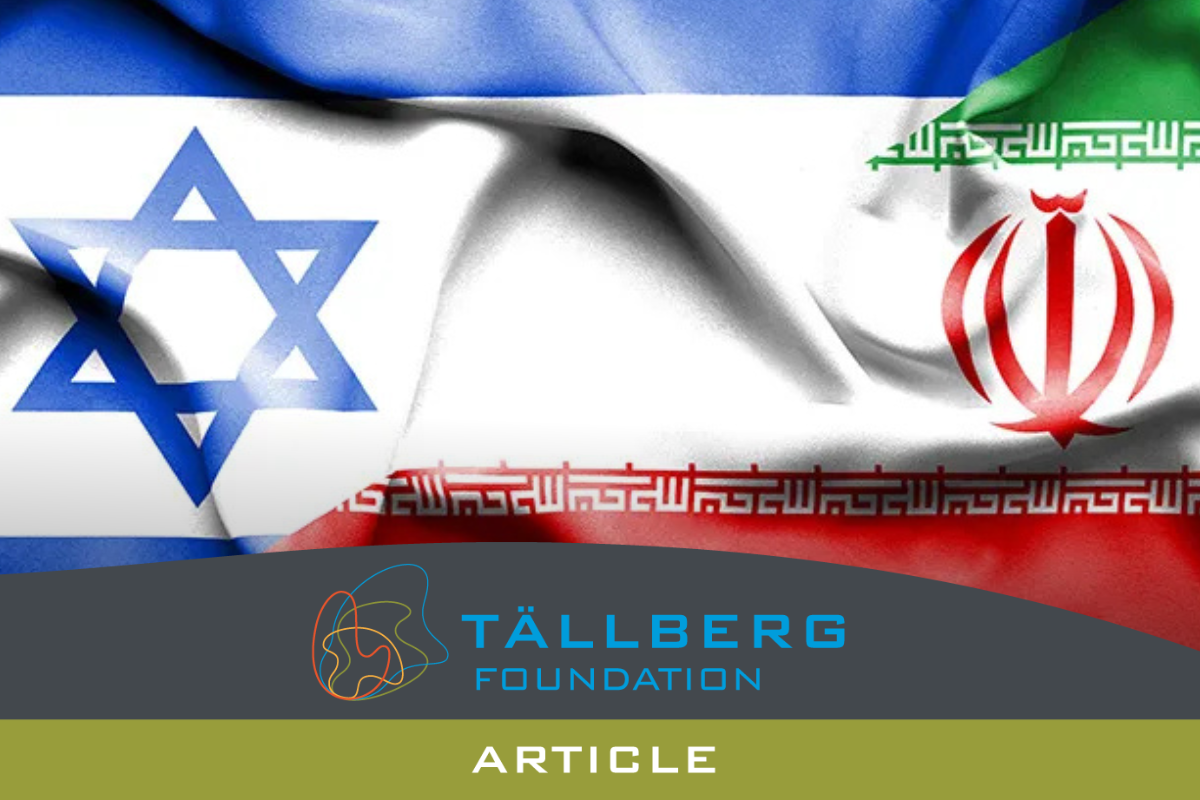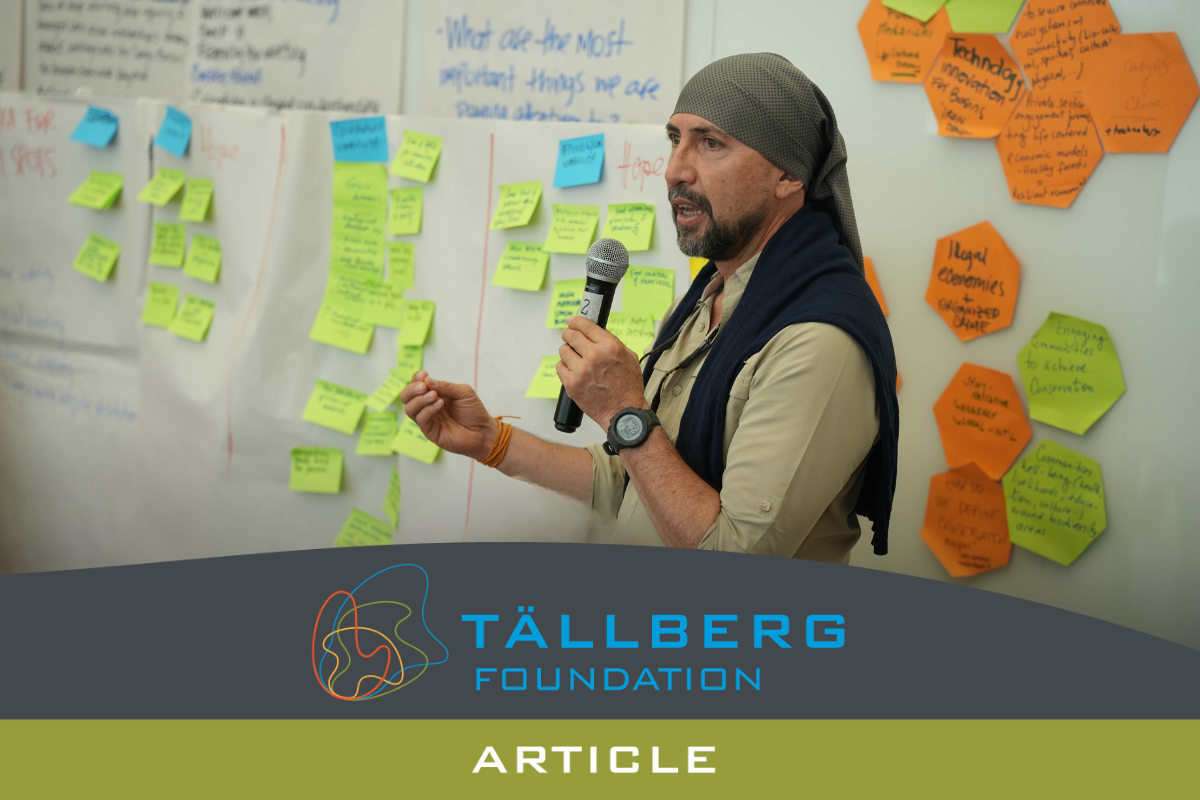Jan Eliasson—Swedish and global diplomat, former Deputy Secretary-General of the United Nations, accomplished conflict mediator—considers himself a “concerned optimist.” As he surveyed the world in a New Thinking for a New World podcast with host Alan Stoga, sometimes he seems more concerned than optimistic—and that troubles him.
“I am now very worried about where we are. I see multilateralism in crisis. I see polarization, not only between nations, but inside nations, getting more and more nasty. I see political forces at work, which bring out almost the worst in us.” Eliasson described a grim world: increasing inequalities in most democracies; growing poverty and hunger in Africa, Asia, and South America; “hoarding,” “rivalries,” and “borders,” instead of cooperation and sharing within the European Union; mistrust and growing confrontation among Great Powers; more frequent and more deadly proxy wars in the Middle East, the Caucasus, and Africa; the development of a new generation of nuclear weapons and the rising existential threat of nuclear war.
He pointed to the Doomsday Clock maintained by the Bulletin of Atomic Scientists that now shows “two or three minutes to midnight…usually it was five to 10 minutes.” Indeed, Eliasson said that, by early next year, “we may have no agreement whatsoever to regulate the nuclear issues between U.S. and Russia, which is absolutely extremely dangerous.”
It’s not a pretty picture, especially for someone who has spent his long diplomatic career working to make the forces of good more muscular. What went wrong? More importantly, how can it be corrected?
Eliasson’s answer started with the United Nations, an institution that is currently celebrating its 75th anniversary. Eliasson has been closely associated with the UN over the past decades: it shaped him and he has helped shape it. He believes that, “The UN charter is one of the best drafted documents that I’ve ever run across. It covers the principles that should guide our action. It sets the direction forward for international cooperation.” Indeed, “I think the UN has aged well, and I think the UN charter, and the institution as such, could adapt to the times in which we live now, if the member states are willing to do so.”
That’s the big question for Eliasson. “The UN will be, as always, a reflection, a mirror of the world as it is. The world is in pretty poor shape today. And thus, almost automatically, the UN also is in poor shape.” The problem lies with the severe tensions among the most powerful countries. “We have landed in a situation of very deep mistrust. I think it has increased rather drastically the last four or five years. When I left the UN, we could still have discussions in the corridors and find pragmatic solutions to most issues, perhaps except Syria. But now it seems like the dialogue is extremely poor.”
Perceptions of the U.N.

Pew Research, September 2020
Eliasson is the sort of leader who instinctively looks for solutions. How to overcome the “deficit in dialogue” that he perceives globally? “We need to have the methods of diplomacy refined and brought up in front of everybody,” citing chapter six of the UN charter that lists eight different methods. How to confront the growing nationalism in Europe and the United States? “Take away the border lines between national and international” and encourage “enlightened self-interest to choose a direction which is good for nations, but also for the world community.”
If there is one thing that Eliasson is sure of, it is “that good international cooperation [and] good international agreements are in the national interest of nations.”This is not only because of his deep commitment to multilateralism, but also because he is profoundly pragmatic. “You can’t deal with migration issues or climate change or pandemics from a national perspective; they are global issues.” Indeed, solutions require a division of labor between national and international actors. It also requires “a wake-up call for good governance—good governance that mobilizes these forces at home and abroad in different categories.”
Of course, goodwill—if it can somehow be mobilized—needs a good plan. And Eliasson has a plan or, rather, he played an important role in helping birth the Sustainable Development Goals (SDGs) in 2015. Quoting a Swedish environmental scientist, Eliasson described the SDGs as “the survival kit for humanity…17 goals, 169 targets. It’s like a great to-do list for the world.”
The massive resources that are being mobilized to cope with Covid-19 and its consequences are an opportunity: “One of the great things to achieve would be to have a logical bridge between the fighting the pandemic and fighting climate change, and using the SDGs as the tool to get there.” He also hopes that those resources could help the many millions of people around the world who have been pushed back into extreme poverty to recover towards a sustainable future.
Eliasson is a veteran of too many negotiations and mediations to count; that he keeps at it today—he has been involved in the evolving Nagorno-Karabakh situation—reflects his deep belief in the power of rational conversation as well as his experience that, sooner or later, enlightened self-interest wins out. Those are core elements of his worldview. So, too, is belief in the “enormous potential in the power and role of women on the one hand, and the power and role of youth.” By way of example, he pointed out that, engaging women leaders in his mediation efforts brought “the human dimension” into the negotiations with profoundly positive effect. And he is a champion of engaging youth because “they have an absolutely clear sense of what is right and wrong,” that is too often missing in politics.
Women, youth, muscular forces for good, values, enlightened self-interest, leadership: all core elements of Eliasson’s cautious optimism that the world can get to a better place. And, individual responsibility underpins everything.
As he pointed out, “The first three words of the UN Charter are ‘We the peoples,’ not ‘We the governments.”
People power wins out.
Let us know what YOU think and comment below.
Ambassador Jan Eliasson recently spoke with Alan Stoga, as part of the Tällberg Foundation’s “New Thinking for a New World” podcast series. Hear their whole conversation HERE, or find us on a podcast platform of your choice (Itunes, Spotify, Acast, Stitcher, Libsyn).
 Ambassador Jan Eliasson is a well-known Swedish and international diplomat. He was Deputy Secretary-General of the United Nations from July 2012 to December 2016 and Sweden’s Minister for Foreign Affairs in 2006. Furthermore, he was President of the 60th session of the UN General Assembly in 2005–06; the UN Secretary-General’s Special Envoy for Darfur in 2007–08; the first UN Under-Secretary-General for Humanitarian Affairs, 1992–94; and participated, 1980–86, in the UN mission mediating in the Iran–Iraq War, which was headed by former Prime Minister Olof Palme of Sweden.
Ambassador Jan Eliasson is a well-known Swedish and international diplomat. He was Deputy Secretary-General of the United Nations from July 2012 to December 2016 and Sweden’s Minister for Foreign Affairs in 2006. Furthermore, he was President of the 60th session of the UN General Assembly in 2005–06; the UN Secretary-General’s Special Envoy for Darfur in 2007–08; the first UN Under-Secretary-General for Humanitarian Affairs, 1992–94; and participated, 1980–86, in the UN mission mediating in the Iran–Iraq War, which was headed by former Prime Minister Olof Palme of Sweden.
The Swedish Government appointed Ambassador Jan Eliasson, in 2017, as the Chair of the SIPRI Governing Board.





Democratic Anarchy is the Future of Democracy
Generally, it is assumed throughout the world that the democratic way of decision-making is the best possible and, therefore, the most acceptable. The problem is nobody knows precisely what this means. It would be ideal if people mutually agree and create rules on an equal basis that would be valid in their collective. However, this is impossible to achieve because every society brings a vast number of decisions that all people cannot decide on, either due to lack of interest, knowledge, or time. People also cannot do it because they can hardly agree about something and can never agree about everything. The democracy we know cannot be created directly by people.
Therefore, we accept an indirect form of democracy where people elect their representatives in governments to rule in their names. Candidates, who present the best choice to the people and win the most votes at the polls, receive the mandate to represent the people and govern on behalf of them in a given period. The peoples’ representatives in government should represent the interests of their electors. Still, they cannot do it successfully enough because they have insufficient insight into the wishes of the voters who have elected them.
An elected government has no desire to meet the needs of those people who did not vote for them. Besides that, representatives of the people are quite privileged and preferably represent self-interests than people’s interests. So that in practice, indirect forms of democracy do not adequately follow the will of people and therefore, people are hardly satisfied. Also, the democratically elected leaders can cause significant harm to the people from which there is not an adequate defence. For example, democratically elected Adolf Hitler and George Bush are remembered mostly by the destructions they created “in the name of the people.”
People’s will may be followed to a greater extent by a direct form of democracy through referendums, where people directly decide on issues pursuing their interest. The majority of people either accept or reject the proposed decision. This form of democracy also has significant disadvantages. Firstly, a majority of people might outvote a minority and thus cause inconvenience to the minority, which is unacceptable. The consensus among representatives of people about voting issues makes such a form of democracy more acceptable. However, direct democracy is rarely applied, primarily because governments do not like people messing with their policy-making and also because the organization of referendums is not a simple process. Finally, each society brings a vast number of decisions of which one could not call for referendums because people do not have enough knowledge about, or are not interested in, or do not have time to participate in them.
As a result, all decisions in society are brought by authorities who do not follow people’s will sufficiently. The political, judicial, and executive branches of government support the needs of the privileged elite over the people. Today the improvements in society may happen when the elite support the changes. If the elite do not support them, the changes would most likely not occur. People can hardly reach their rights through the democracy we have today.
Does this mean that the will of the people cannot be carried out? That democracy cannot be developed? Scholars of social sciences do not see a solution to the problem of democracy and cannot establish any consensus on how a developed democracy should look. Establishing a developed form of democracy requires discovering a new pathway that will effectively implement people’s will. To reach it, one needs to think outside the box. A fully developed democracy will be based on a very straightforward idea.
***
The future of democracy will not be primarily based on voting for people anymore, but rather on evaluations of the people by the people. Individuals will get an equal and independent legislative, judiciary, and executive powers of assessing other people. Such a way of making decisions will follow the interest of people in the best possible way. Such a democracy will be simple, quick, correct, and efficient. The powers of assessment of all the people joined together will completely change the foundation of society and social relationships.
Let us allow every person, who within the scope of their activity, can affect us in any way, do it freely upon their will. We do not even have many choices because we cannot interfere with the freedom of activities of presidents, doctors and mechanics, or any other person, nor do we have the ability, nor the time, nor the right, perhaps not even the desire to do so. However, all these people create advantages and disadvantages for other people through their actions.
We can sense whether or not the activities of a president, doctor, mechanic, or any other person, bring some advantages or disadvantages to us. And according to it, we should have the right to award a person who creates advantages for us and punish a person who produces disadvantages for us. Such a right would direct all people to perform the most significant benefits and the least damages to other people. Such an orientation of society would indeed follow the people’s will in the best possible way and, therefore, would present a developed democracy.
Equal rights of people are the only proper orientation of society. In this regard, let each person have the same power to negatively evaluate, let us say, three individuals who hurt them the most in any month, and to assess positively, let us say, three individuals who create the most significant benefits in a month. For example, if the prime mister, neighbour, and boss harm a person the most in one month, they will negatively evaluate them. If a friend, teacher, or singer, produce the most significant benefits to a person, they will normally positively assess them. Also, people may use all the evaluations for positive or negative assessments, or in any combination. Equal power of individuals to award and punish individuals will present a developed form of democracy. This is the essence, and the rest is a technical matter which will be performed through an application on the Internet.
The sum of all of the positive and negative evaluations that individuals receive from other people could be publically presented on the Internet. The counting of these evaluations will tell everyone how appreciated they are in society. These evaluations will become at least as important to people as visits, likes, and followers are important today. Nobody would like to be on the negative side of assessment, but on the positive one as much as they can. They will achieve this goal by working hard to create the most significant advantages for the community and diminish or abolish all disadvantages. This will create a good society.
In this manner, all people will become equal authorities who have a small direct power in society. Given that all people will have equal rights and the power to give their awards and punishments to other people independently of any written rules, such a democracy will present anarchy. That is the reason why this evaluating system is called democratic anarchy. This is a clear path toward developed democracy.
People will get direct power in society for the first time in the history of humankind. Such authority will eliminate uncontrolled or insufficiently controlled individual power originating in privileged social status. We need to understand that the privileged position of individuals causes the most significant problems for society. The lack of equal human rights is the main reason society was never good. Democratic anarchy will direct each member of society to respect other people. People will become values to all people. People will be considered equal for the first time ever, and that will result in harmonious and constructive social relations.
People will judge other people freely. In this regard, many people complained that individuals might evaluate other people maliciously because of spite or envy. The answer is that such a risk exists, but the individual assessment cannot cause significant harm to anyone. The damage that an individual can make is insignificant compared to the damage authorities can make because they often pull back the whole countries. For example, Adolf Hitler and George Bush. In the proposed system, these individuals would get a large number of negative evaluations from people, which through minor regulation, may prevent them from leading people and causing the evil they are famous for.
Is it worthwhile to allow individuals to wrongly judge others if such “trials” would abolish all destructiveness in society? Of course, it is. The new system will also develop objective values in society and people’s conscience where malice and envy hardly exist. If something like that still happens, each person would be able to correct a possible wrongful assessment that they gave to people by instigating a correct evaluation even many years later when they experience enlightenment under the influence of equal human rights. And they will.
Something similar to democratic anarchy is already implemented on YouTube, where people get a chance to vote for songs or videos with a “like” or “dislike.” There is never more than 5% of people who evaluate songs or videos dishonestly, which means that 95% of the people value others fairly. This suggests that democratic anarchy will serve society well, even better than YouTube, because people will have limited evaluation rights and will not spend them irrationally. They will evaluate other people honestly because they will feel honoured by having direct power in society.
For those who are still suspicious about democratic anarchy, we may first implement it by presenting the evaluations only to the evaluated people themselves and not to anybody else. This would be like people listening to an anonymous gossip about themselves, and everyone will be interested to hear it. As a result, most of the people will try to improve their behaviour in society. However, the secret results of the evaluation will not stop the worst people from continuing bad behaviour. Then society may decide to stop the bad people by democratic acceptance of the full implementation of democratic anarchy. And even then, if people receive more positive than negative evaluations, they may keep the result a secret to other people. If the total assessment is negative, it will be visible to everyone, forcing negatively evaluated people to improve their behaviour.
Many people, including university professors, have given remarks in the sense that people cannot judge other people objectively. The answer to them is that objectivity is desirable but not essential. Besides, voters do not need to be smart or educated to have the right to vote. People will judge others the way they feel, and every person will be obliged to take into account the consequences his or her actions may have on other people. This is all that is needed for creating a good society. By adopting democratic anarchy, people will respect other people, and that is what will bring considerable benefits to society. Furthermore, a system that supports people’s equal rights will develop objectivity in the community, and when that happens, people will judge other people objectively.
Individuals will not have much power in society, but their evaluations joined together will have enormous power. A person who receives a large number of negative assessments would try even harder to avoid doing anything inconvenient to other people. Besides, the person who receives bad evaluations would never know who has evaluated them negatively, so that they will try to improve their behaviour towards everyone. As a result, bullies will not harass children at school anymore, employers will not abuse their employees at work, neighbours will not produce obnoxious noise at night, salespeople will not cheat their customers, politicians will not lie to people, etc. They will all try to please other people in the best possible way. This will take privileged powers from all the people; this will eliminate social evil and form a good society.
We may increase the anarchic power of people significantly. After people get accustomed to the mutual evaluation, they may increase the power of each assessment by assigning the value of just one dollar to each of them. Each positive evaluation a person receives from somebody will bring them one dollar, and each negative assessment will take one dollar away from them. These evaluations would not affect ordinary people much. If two people do not like each other, they may negatively evaluate each other for years, which would not be a big deal. Getting or losing one dollar in the developed world does not mean much.
The power of evaluations will extremely efficiently affect authorities responsible for making decisions in society. The higher the position a leader has in society, the greater their responsibility to society would be. For example, the US President might get 100,000,000 bad evaluations from the American people for bad policies, lies, and criminal aggression on countries. That would cost the President $100,000,000 in only one month. On the other hand, one may doubt that their supporters would certainly evaluate him positively because they might easily have higher positive evaluation priorities and would spend their positive evaluations elsewhere. Non-privileged presidents would no longer dare perform bad policies anymore. And if it happens somehow, they would instantly leave their positions. Only the most skilful and brave individuals would dare lead countries. They will not be authorities anymore, but our servants.
So what if influential people who own mass media unfairly accuse someone of evil in society and thus prompt people to give bad evaluations to the wrong person? Such things are easily possible in today’s society. However, there is a proverb that says: “Lies have short legs.” One day the lies will be revealed, and then nobody would like to be in the place of these individuals who lied because the people will punish them for sure. They may be receiving the punishments for a long time and would not dare to be immoral again. One can only imagine what kind of power democratic anarchy would bring to individuals if their evaluations get the authority to impact the past work values of people. This is the prospect of socialism and communism.
The point of democracy is to make rules which will make people live well. So far, that was only possible through law. In the future, democratic anarchy will replace the democracy we have today because it will create the best solution for individuals and society as a whole. People themselves being equal to others will make their lives better than the authorities could do for them. Democratic anarchy will replace the enormous regulation imposed by authorities because people will act better than the law can regulate. When people get the power to enforce justice on their own, people will behave much better towards each other, and they will seek justice in courts much less. Once democratic anarchy is established, the need for laws will be significantly reduced, and courts will start losing their importance, together with the state oppression apparatus, including the police. In the distant future, most state regulations will become obsolete, which means they will go down in history. Democratic anarchy cannot be corrupted. It will eliminate immorality in society. Through equal rights of evaluation, people will learn what is moral and obey the morality they spontaneously establish. Democratic anarchy will ultimately create an ethical and fair society.
***
Under pressure from democratic anarchy, governments will inevitably follow the needs of the people. The authorities would not dare to make the most important decisions for society alone because they can easily make mistakes that might bring about the people’s wrath and a large number of negative evaluations. If the authorities are not sure what the people’s needs are, then their responsibility, clearly defined by the respect of peoples’ evaluations, will direct them to discover love towards peoples’ participation in strategic decision-making processes through referendums. In this regard, they will develop a simple, fast, and efficient method for direct decision-making of the people, most likely over the Internet.
The people will directly create society’s macroeconomic policy because it is the foundation that directs the economy, which means the entire community. How? Quite simply, one needs to enable people to decide how much money they want to pay for taxes from their gross income. The total sum of all the peoples’ expressions about the taxation will determine the total amount of money allocated for collective consumption. People will not pay the taxes as much as they want. They will form the total amount of money for taxes, which then will be collected proportionally to the heights of their salaries. Furthermore, in the same way, each person can decide on how tax is spent. Each person will determine how much tax they would set aside to develop the economy, safety, education, health, infrastructure and other collective consumption needs.
Theoretically, people can decide on a collective consumption within the consumer groups as much as they want. All these shared consumption groups will have a far more significant overall impact if they are democratically allocated. Following the living experience, people will learn how much money should be collected for taxes and the best way to spend it. Thus, this spending will no longer be alienated from society; it will follow people’s needs in the most efficient way. The people will become active members of society, and so they will accept their communities. Given that the new system offers stable and good relations among nations, people will no longer allocate money for the needs of armies, and armies will cease to exist. In the proposed democracy, waging wars will no longer be possible.
The people must directly make strategic decisions in society because that is the only way the policy of society certainly follows the people’s interests. Professionals could make all other decisions, and they will be directly responsible to the people for those decisions. Once people get the direct power to participate in the decision-making process and judge those who make decisions on their behalf, it will present the most developed form of democracy. There is no better political way. Such a democracy will realize all the dreamers’ dreams in the history of humankind. Once such democracy is accepted, people will become so satisfied that they will not allow anyone to seize it from them.
***
Democratic anarchy is the most critical natural law of society. It will create a good society and the best life possible for all.
It is clear that Ambassador Jan Eliasson is a great man. ” Tow roads diverged in a wood and I/ I took the road less traveled by/ And that has made all the difference”- Robert Frost. In spite of the fact that the road taken may not be the right one; the road less taken may lead to the right place. Ambassador Eliasson can lead …
The world needs this kind of people leading in the right direction. We are all needed for that kind of responsability, so please: read and act!